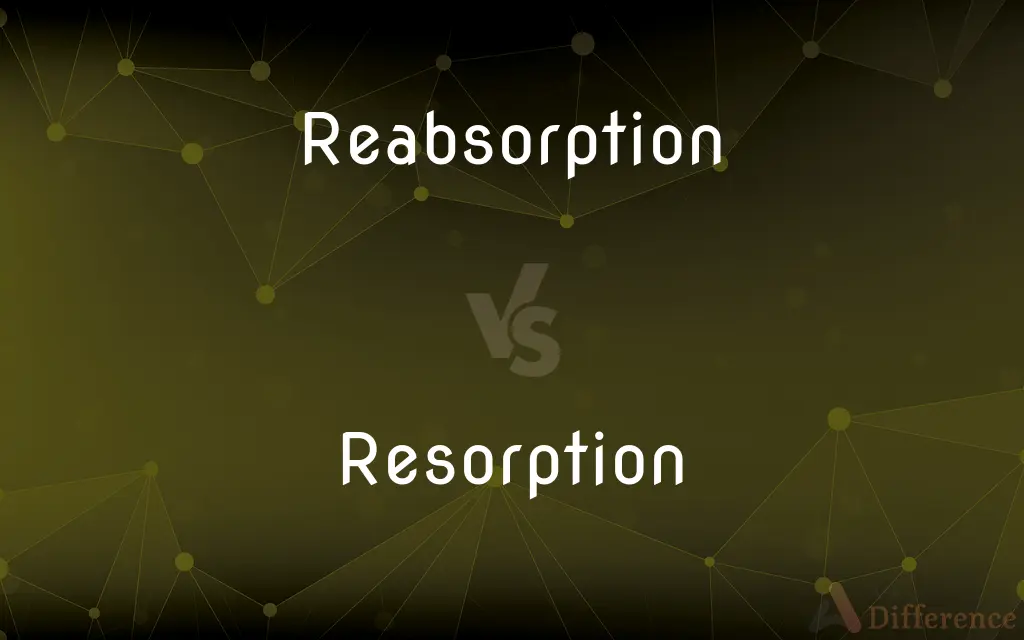Reabsorption vs. Resorption — What's the Difference?
By Tayyaba Rehman & Fiza Rafique — Updated on September 8, 2023
Reabsorption refers to the process of taking back substances into a biological system that were initially secreted or excreted. Resorption is the breakdown and assimilation of materials within an organism.

Difference Between Reabsorption and Resorption
Table of Contents
ADVERTISEMENT
Key Differences
Reabsorption is a physiological process wherein a substance that has been secreted or excreted is taken back into the system from which it originated. This is most commonly discussed in the context of kidney function, where certain nutrients and electrolytes are reabsorbed into the bloodstream from the renal tubules. On the other hand, resorption is a process where tissues, cells, or other biological substances are broken down and re-assimilated into the biological system, often releasing stored nutrients or minerals back into the circulation.
In reabsorption, the focus is on the conservation of essential substances. For example, the reabsorption of glucose in the kidneys is critical for maintaining energy balance in the body. Resorption, however, often involves the breaking down of existing tissues or structures, as seen in bone resorption, where the mineral content of bone is returned to the bloodstream.
The root words give clues to their meanings: "Reabsorption" has "re-" implying a taking back, and "absorption" meaning to take in. "Resorption" has "re-" and "sorption," where sorption implies both absorption and desorption, or taking in and giving off. While reabsorption is primarily a selective uptake, resorption is a more generalized term involving both breakdown and uptake.
Both processes are essential in maintaining homeostasis within an organism. Reabsorption is necessary for nutrient conservation and waste minimization, whereas resorption is crucial for remodeling tissues and mobilizing stored nutrients. Despite the similarities in their names, these terms describe distinctly different physiological processes.
Comparison Chart
Meaning
Taking back substances
Breakdown and assimilation
ADVERTISEMENT
Common Context
Kidneys, digestive system
Bones, tissues
Purpose
Conservation
Remodeling, mobilization
Directionality
Usually unidirectional
Can be bidirectional
Root Words
Re- + Absorption
Re- + Sorption
Compare with Definitions
Reabsorption
Reabsorption is the uptake of substances back into a biological system.
The reabsorption of water in the kidneys is vital for hydration.
Resorption
Resorption involves the breakdown and re-assimilation of materials within an organism.
Bone resorption releases calcium into the bloodstream.
Reabsorption
Reabsorption minimizes waste and is energy-efficient.
Efficient reabsorption mechanisms limit waste excretion.
Resorption
Resorption is a part of many physiological cycles.
Tooth resorption is common in various life stages.
Reabsorption
Reabsorption is selective and controlled by biological mechanisms.
Hormonal changes can affect glucose reabsorption in the kidneys.
Resorption
Resorption often leads to the remodeling of tissues.
Resorption of cartilage can be a symptom of arthritis.
Reabsorption
Reabsorption is essential for homeostasis.
Calcium reabsorption is critical for maintaining stable blood calcium levels.
Resorption
Resorption is involved in mobilizing stored nutrients.
Fat resorption provides energy during fasting.
Reabsorption
Reabsorption often occurs in the kidneys to conserve essential nutrients.
Sodium reabsorption helps maintain electrolyte balance.
Resorption
Resorption can be stimulated by hormonal changes.
Parathyroid hormone stimulates bone resorption.
Reabsorption
In renal physiology, reabsorption or tubular reabsorption is the process by which the nephron removes water and solutes from the tubular fluid (pre-urine) and returns them to the circulating blood. It is called reabsorption (and not absorption) both because these substances have already been absorbed once (particularly in the intestines) and because the body is reclaiming them from a postglomerular fluid stream that is well on its way to becoming urine (that is, they will soon be lost to the urine unless they are reclaimed).
Resorption
Resorption is the absorption into the circulatory system of cells or tissue, usually by osteoclasts.Types of resorption include:
Reabsorption
The process of absorbing something again
Diuretics act primarily by blocking reabsorption of sodium
Resorption
The process or action by which something is reabsorbed
The resorption of water
Reabsorption
To absorb again.
Resorption
The act or process of resorbing.
Reabsorption
To accommodate or accept again, as into a group or category
The economy cannot reabsorb all of the refugees into the workforce.
Resorption
The act of resorbing.
Reabsorption
To undergo resorption.
Resorption
The redissolving, wholly or in part, in the molten magma of an igneous rock, of crystals previously formed.
Reabsorption
(physics) The subsequent absorption of emitted radiation.
Resorption
(medicine) The loss and reassimilation of bone (or other) material.
Reabsorption
(physiology) The subsequent absorption of a secreted substance.
Resorption
The act of resorbing; also, the act of absorbing again; reabsorption.
Reabsorption
The act or process of reabsorbing.
Resorption
The redissolving wholly or in part, in the molten magma of an igneous rock, of crystals previously formed. The dissolved material may again solidify, giving rise to a mass of small crystals, usually of a different kind.
Reabsorption
The organic process in which the substance of some differentiated structure that has been produced by the body undergoes lysis and assimilation
Resorption
The organic process in which the substance of some differentiated structure that has been produced by the body undergoes lysis and assimilation
Common Curiosities
Where is resorption commonly observed?
In bones and various tissues.
What is the basic function of resorption?
Resorption breaks down and assimilates materials within the system.
How do reabsorption and resorption differ in purpose?
Reabsorption focuses on conservation, while resorption focuses on remodeling and mobilization.
Where is reabsorption commonly observed?
In the kidneys and the digestive system.
How do hormones affect reabsorption?
They can control the rate and selectivity.
What is the basic function of reabsorption?
Reabsorption takes back substances into the system from which they were excreted.
Is resorption a unidirectional process?
No, it can be bidirectional.
Is reabsorption a unidirectional process?
Usually, yes.
Is energy required for reabsorption?
Often, yes.
Can reabsorption be pathological?
Yes, when it's excessive or insufficient, like in some kidney diseases.
How do hormones affect resorption?
They can stimulate or inhibit the process.
Can resorption be pathological?
Yes, in conditions like osteoporosis or certain metabolic disorders.
Is reabsorption involved in homeostasis?
Yes, it helps maintain internal balance.
Is energy required for resorption?
Yes, especially for cellular mechanisms.
Is resorption involved in homeostasis?
Yes, especially in mineral homeostasis.
Share Your Discovery

Previous Comparison
Beaver vs. Woodchuck
Next Comparison
Porch vs. DeckAuthor Spotlight
Written by
Tayyaba RehmanTayyaba Rehman is a distinguished writer, currently serving as a primary contributor to askdifference.com. As a researcher in semantics and etymology, Tayyaba's passion for the complexity of languages and their distinctions has found a perfect home on the platform. Tayyaba delves into the intricacies of language, distinguishing between commonly confused words and phrases, thereby providing clarity for readers worldwide.
Co-written by
Fiza RafiqueFiza Rafique is a skilled content writer at AskDifference.com, where she meticulously refines and enhances written pieces. Drawing from her vast editorial expertise, Fiza ensures clarity, accuracy, and precision in every article. Passionate about language, she continually seeks to elevate the quality of content for readers worldwide.














































